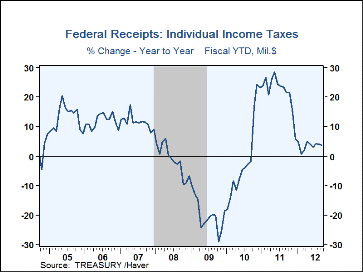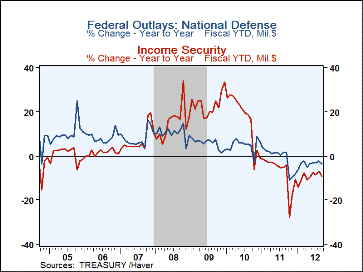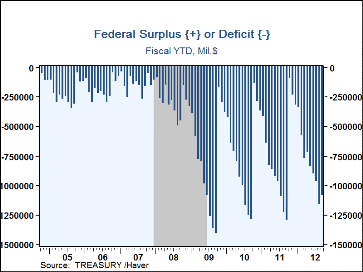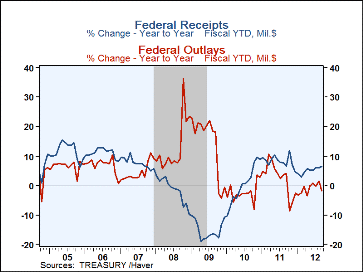 Global| Oct 15 2012
Global| Oct 15 2012U.S. Budget Deficit Shrinks For FY'12
by:Tom Moeller
|in:Economy in Brief
Summary
The Federal Government Budget Deficit fell to $1,089B for all of FY'12 from $1,298B in FY'11, according to figures released Friday by the U.S. Treasury. In a sign of economic improvement, part of that shrinkage owed to a $75.0B [...]
The Federal Government Budget Deficit fell to $1,089B for all of FY'12 from $1,298B in FY'11, according to figures released Friday by the U.S. Treasury. In a sign of economic improvement, part of that shrinkage owed to a $75.0B surplus in September, the first September surplus since 2008. As a percent of GDP, the FY'12 deficit fell to 7.0% of GDP, its least in three years. Receipts totaled a stable 15.7% of GDP while outlays were a reduced 22.7% of GDP. For FY'13, OMB projections call for a deficit of $991B in FY'13 then $661B in FY'14.
Revenues for FY'12 rose 6.4% y/y. Individual income tax payments increased a modest 3.7% y/y with a 1.4% gain in payroll employment. Corporate tax payments jumped by more than one-third y/y with improved profitability and social insurance taxes rose 3.2%.
Outlays for last fiscal year fell 1.7% due to less spending in most subgroups. National defense payments fell 3.6% last fiscal year while health services spending also fell 7.0%. Income security payments fell 9.2% due to lower unemployment. Social security outlays gained 5.8% with more retirees but Medicare outlays fell 2.8%. Interest payments fell 2.1% y/y with lower interest rates.
Haver's basic data on Federal Government outlays and receipts, and summary presentations of the Budget from both OMB and CBO are contained in USECON. Considerable detail is given in the separate GOVFIN database.
U.S. Monetary Policy and International Implications is the title of yesterday's speech by Federal Reserve chairman Ben. S. Bernanke and it can be found here.


| US Government Finance | Sept | FY'12 | FY'11 | FY'10 | FY'09 |
|---|---|---|---|---|---|
| Budget Balance | $75.0B | $-1,089B | $-1,298.7B | $-1,294.2B | $-1,415.7B |
| As a percent of GDP | -- | 7.0 | 8.6 | 8.0 | 9.5 |
| % of Total | |||||
| Net Revenues (Y/Y % Change) | 100 | 6.4% | 6.5 | 2.7 | -16.6 |
| Individual Income Taxes | 47 | 3.7 | 21.5 | -1.8 | -20.1 |
| Corporate Income Taxes | 8 | 33.8 | -5.4 | 38.5 | -54.6 |
| Social Insurance Taxes | 36 | 3.2 | -5.3 | -2.9 | -1.0 |
| Excise Taxes | 3 | 9.2 | 8.2 | 7.1 | -7.2 |
| Net Outlays (Y/Y % Change) | 100 | -1.7 | 4.1 | -1.8 | 18.2 |
| Nat'l Defense | 20 | -3.6 | 1.7 | 4.6 | 7.6 |
| Health | 10 | -7.0 | 1.0 | 10.4 | 19.1 |
| Medicare | 20 | -2.8 | 7.5 | 5.0 | 10.1 |
| Income Security | 17 | -9.2 | -4.1 | 16.7 | 24.9 |
| Social Security | 20 | 5.8 | 3.4 | 3.5 | 10.7 |
| Veterans Benefits | 4 | -2.0 | 17.3 | 13.6 | 12.7 |
| Interest | 6 | -2.1 | 15.8 | 2.9 | -24.6 |
Tom Moeller
AuthorMore in Author Profile »Prior to joining Haver Analytics in 2000, Mr. Moeller worked as the Economist at Chancellor Capital Management from 1985 to 1999. There, he developed comprehensive economic forecasts and interpreted economic data for equity and fixed income portfolio managers. Also at Chancellor, Mr. Moeller worked as an equity analyst and was responsible for researching and rating companies in the economically sensitive automobile and housing industries for investment in Chancellor’s equity portfolio. Prior to joining Chancellor, Mr. Moeller was an Economist at Citibank from 1979 to 1984. He also analyzed pricing behavior in the metals industry for the Council on Wage and Price Stability in Washington, D.C. In 1999, Mr. Moeller received the award for most accurate forecast from the Forecasters' Club of New York. From 1990 to 1992 he was President of the New York Association for Business Economists. Mr. Moeller earned an M.B.A. in Finance from Fordham University, where he graduated in 1987. He holds a Bachelor of Arts in Economics from George Washington University.
More Economy in Brief
 Global| Feb 05 2026
Global| Feb 05 2026Charts of the Week: Balanced Policy, Resilient Data and AI Narratives
by:Andrew Cates








